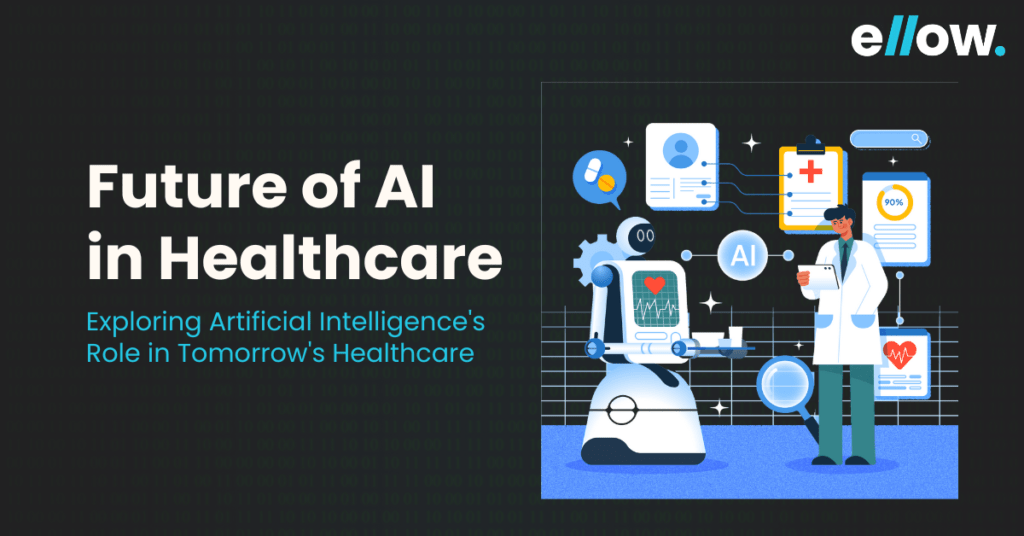Artificial intelligence (AI) is rapidly revolutionizing various industries, and healthcare is no exception.
According to Statista, the global market size of AI in healthcare is projected to reach $76.9 billion by 2025, reflecting the significant impact and growing investment in this field.
AI technologies hold immense potential to reshape patient care and streamline administrative tasks across providers, payers, and pharmaceutical organizations.
Already, numerous studies indicate AI’s capability to match or even surpass human performance in critical healthcare activities such as disease diagnosis. Algorithms are excelling in tasks like identifying malignant tumors, aiding in clinical trial cohort construction, enhancing overall healthcare efficiency, and showing a greater Future of AI in Healthcare.
Despite these advancements, the complete replacement of human involvement by AI in medical processes is still distant due to various factors.
The Role of AI in the Healthcare Industry
Artificial Intelligence (AI) has significantly impacted the healthcare sector, offering innovative solutions to global health challenges.
Use Cases of AI in Health Care
1. Innovative Approaches to Disease Prediction
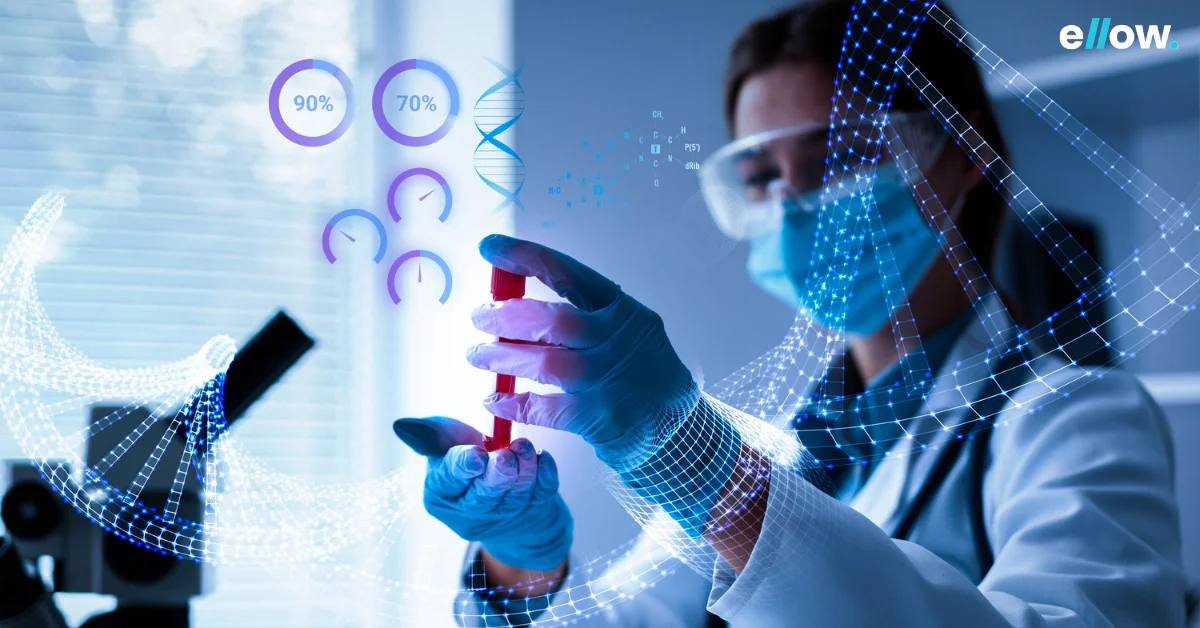
AI facilitates early disease detection by analyzing extensive datasets with precision. Healthcare providers leverage AI to diagnose diseases like cancer in their nascent stages, leading to more accurate prognoses.
By employing intelligent data mining techniques integrated with AI, healthcare professionals can identify patterns indicative of various diseases, enabling early intervention and treatment. AI has revolutionized mammogram evaluations, reducing false results and unnecessary biopsies, with a remarkable accuracy rate of 99% and 30 times faster processing.
2. Robotic Assistance in Surgical Procedures
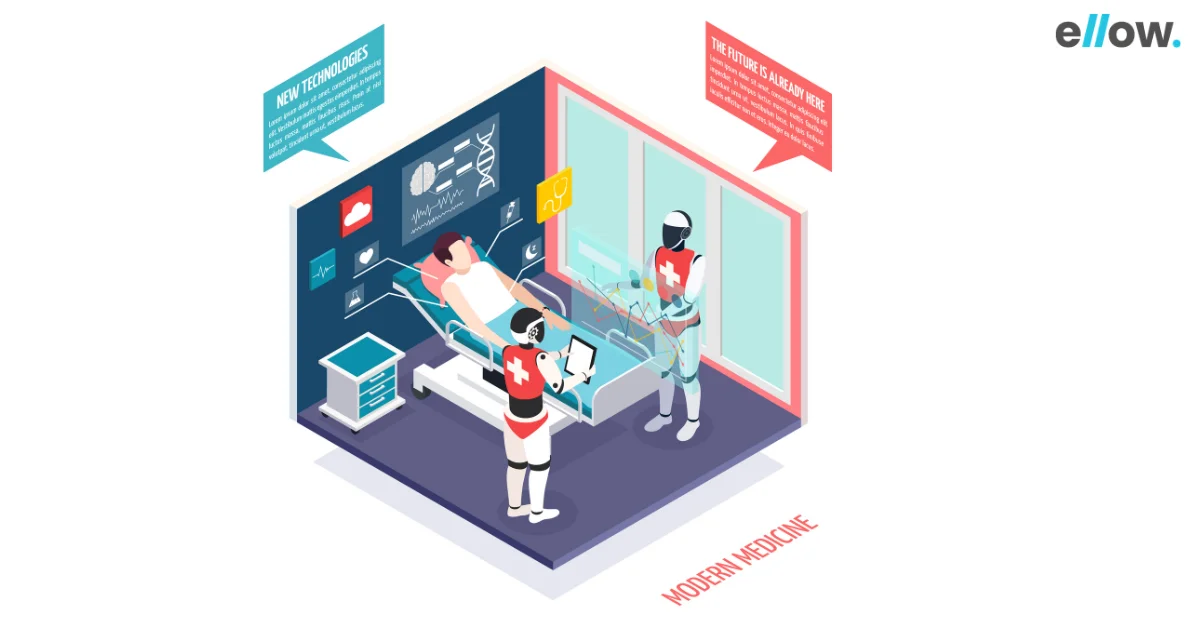
Robotic surgery, a prominent AI application in healthcare, enhances surgical procedures by minimizing human errors and complications. AI-powered robots offer surgeons improved precision and control during operations, ultimately benefiting patient outcomes.
These robotic-assisted surgeries translate into reduced pain, scarring, and faster recovery times for patients, underscoring the advantages of AI in healthcare.
3. Medical Imaging and Diagnostics
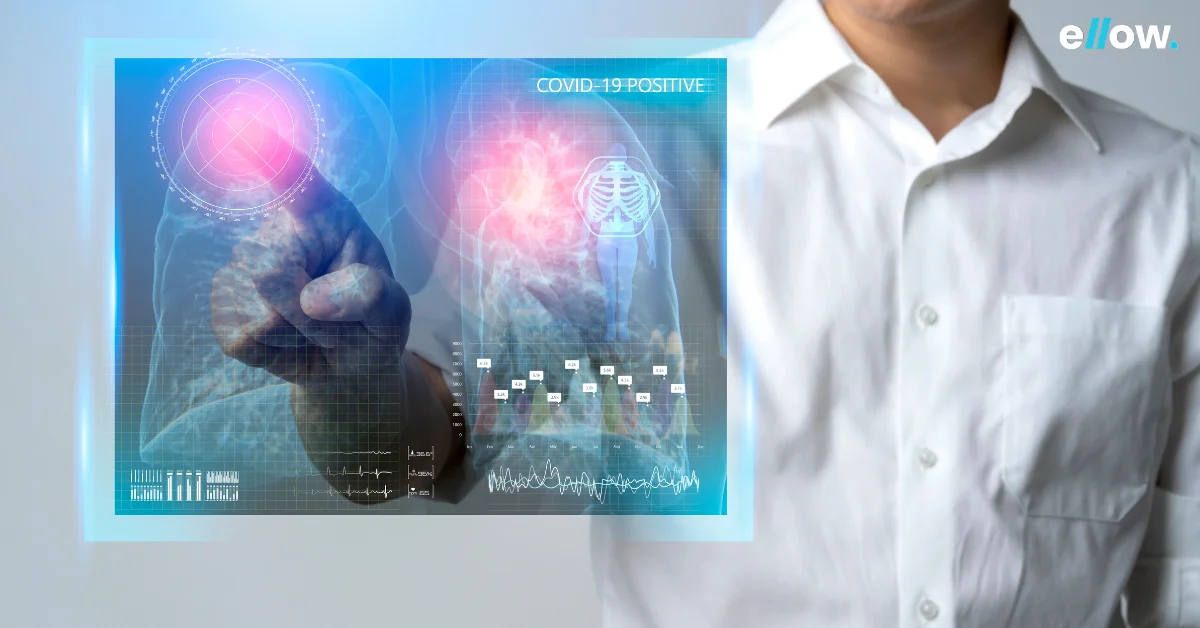
AI is pivotal in medical imaging and diagnostics, where around 38% of medical providers use imaging software. The integration of AI optimizes diagnostic processes by automating tasks, enhancing precision, and accelerating results delivery, thereby improving patient care. AI applications in medical diagnosis range from AI-powered chatbots for symptom analysis to deep learning algorithms for early cancer detection through oncology reports.
4. Drug Discovery
AI has revolutionized drug discovery processes in biotechnology, promising substantial advancements in medicine development. Biotech firms leveraging AI and machine learning stand to create numerous novel medications, projected to generate a $50 billion market over the next decade.
Adopting AI in drug discovery fosters higher success rates in early-stage development, along with cost savings for payors. For example, pharmaceutical giant Pfizer utilizes the IBM Watson Machine Learning platform to expedite drug discovery processes efficiently.
5. Patient Care with AI-driven Solutions
Customized software powered by AI enables healthcare providers to deliver personalized care and streamline administrative tasks. AI-driven solutions aid in patient intake, triage, and real-time prioritization, optimizing workflows and ensuring timely interventions for better patient outcomes.
6. Embracing Telemedicine with AI
Telemedicine has seen a surge in adoption, particularly during the pandemic, with AI playing a vital role in facilitating remote consultations and monitoring. AI-powered telemedicine platforms empower healthcare professionals to reach patients virtually, providing timely and accurate care regardless of geographical barriers.
The Future of Artificial Intelligence in Healthcare
The future of artificial intelligence in healthcare is bright, promising improved patient care, enhanced diagnosis and treatment, and greater efficiency in healthcare delivery. As AI continues to evolve, its collaborative role alongside human clinicians will shape a healthcare landscape that prioritizes both technological innovation and compassionate care.
1. Emotion AI for ASD (Autism Spectrum Disorder) and Mental Health Issues
Emotion AI is proving to be a game-changer in providing support for individuals with Autism Spectrum Disorder (ASD) and other mental health issues. Through sophisticated algorithms, AI-powered telemedicine applications offer more engaging and insightful interactions, aiding in diagnosis and treatment. Speech analysis, a component of emotion AI, holds promise in identifying various mental illnesses, including depression, dementia, and autism.
2. Personalized Healthcare Services
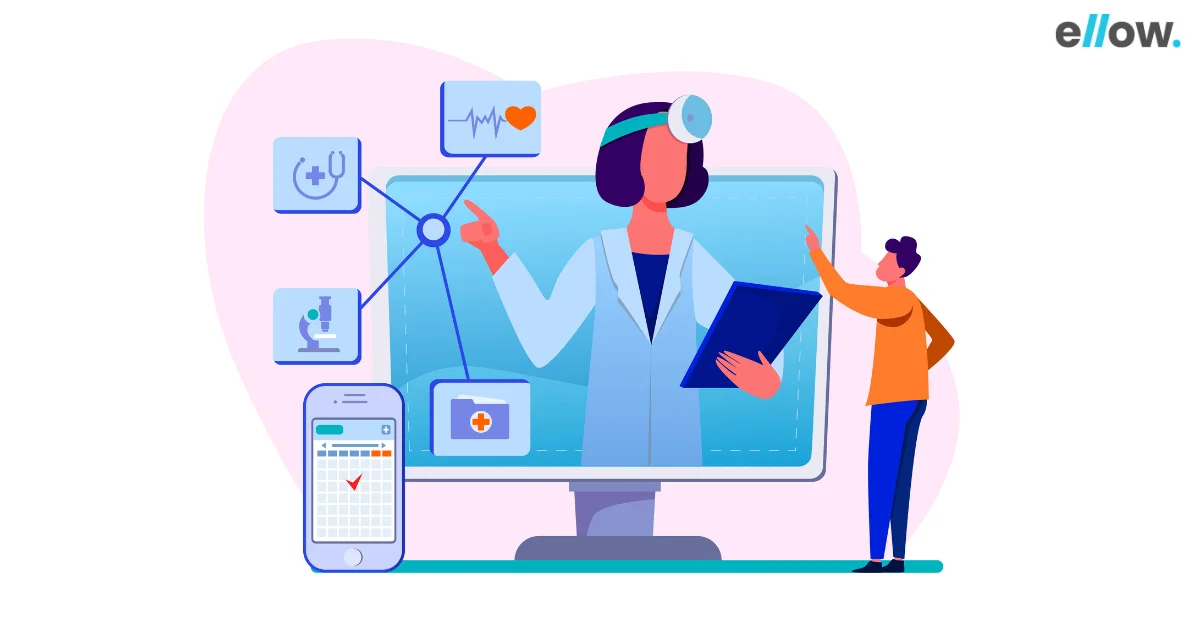
The future of healthcare is personalized, with AI-driven solutions leading the charge. Healthcare organizations are increasingly leveraging vast datasets to gain valuable insights for customizing treatment plans.
Wearable technology, such as smartwatches and sensor garments, gathers real-time health data, enabling AI-powered applications to offer personalized diet and exercise regimens based on individual needs.
3. Ambient Intelligence for Enhanced Healthcare
Ambient Intelligence (AmI) is emerging as a pivotal trend in healthcare solution development, blending AI with IoT and Big Data.
This synergy streamlines patient care by expediting consultations, automating emergency support, and continuously monitoring vital signs. Through AmI, the healthcare experience becomes more efficient and proactive, promoting better outcomes for patients.
4. Diagnosis of Chronic Diseases with AI
AI holds immense potential in diagnosing chronic diseases accurately and efficiently. By analyzing vast amounts of patient data, AI algorithms provide insights that assist clinicians in making informed decisions. Advanced computational models, like AI-enabled whole-heart models, offer personalized treatment approaches, particularly beneficial in managing conditions like ventricular arrhythmia.
Types of Artificial Intelligence in Healthcare
Artificial intelligence (AI) encompasses various technologies, each with distinct functions applicable to healthcare. Below are some of the key AI technologies revolutionizing the healthcare sector.
1. Machine Learning
Machine learning, a fundamental aspect of artificial intelligence, is like teaching a computer to recognize patterns and make decisions based on data. In healthcare, this means using vast amounts of patient information to predict outcomes or recommend treatments. Imagine feeding a computer thousands of medical records with details about patients’ symptoms, diagnoses, and responses to treatments.
Through machine learning, the computer learns from this data to identify trends and associations that humans might miss. This can help doctors tailor treatment plans for individual patients, leading to more personalized and effective care.
Additionally, machine learning algorithms can continuously improve over time as they receive more data, making them powerful tools for advancing medical research and improving healthcare outcomes.
2. Internet of Things (IoT)
The Internet of Things (IoT) is a network of interconnected devices, such as sensors, monitors, and medical equipment, that can communicate and share data over the Internet.
In healthcare, IoT plays a crucial role in enabling continuous monitoring of patients’ vital signs and health metrics. For example, wearable sensors can track heart rate, blood pressure, and glucose levels in real time.
These devices transmit data to healthcare providers, allowing for remote monitoring and timely interventions, even outside traditional clinical settings. By facilitating proactive healthcare management and early detection of potential issues, IoT technology enhances patient outcomes and improves the overall quality of care.
Additionally, IoT devices can support personalized treatment plans by providing clinicians with valuable insights into patients’ day-to-day health status and trends.
3. Internet of Medical Things (IoMT)
The Internet of Medical Things (IoMT) is an extension of the broader concept of the Internet of Things (IoT), specifically tailored for healthcare. IoMT encompasses a vast array of interconnected medical devices and systems, ranging from wearable health trackers to advanced diagnostic equipment. These devices are equipped with sensors and communication capabilities, allowing them to collect and exchange data in real time.
In healthcare, IoMT plays a role in enhancing patient care by enabling continuous monitoring of vital signs, medication adherence tracking, and remote patient management. By providing healthcare professionals with timely access to patient data, IoMT facilitates early detection of health issues, personalized treatment plans, and improved patient outcomes.
Additionally, IoMT contributes to the efficiency of healthcare delivery by streamlining processes, reducing healthcare costs, and empowering patients to take a more proactive role in managing their health.
4. Robotic Process Automation (RPA)
Robotic Process Automation (RPA) is like having a virtual assistant that can handle repetitive tasks in healthcare settings. Imagine tasks such as updating patient records, processing insurance claims, or scheduling appointments being done automatically by software robots. These robots mimic human actions, interacting with various systems and applications just as a human employee would.
By automating these routine tasks, RPA helps healthcare organizations save time, reduce errors, and cut costs. This means healthcare staff can focus more on delivering quality care to patients instead of being bogged down by administrative duties.
Additionally, RPA can improve accuracy and efficiency by executing tasks consistently and without the risk of human error. Overall, RPA holds great potential to revolutionize administrative processes in healthcare, making them more streamlined and effective.
5. Rule-Based Expert Systems
Rule-Based Expert Systems are like digital assistants programmed with sets of “if-then” rules, mimicking human decision-making processes. In healthcare, these systems assist medical professionals by analyzing patient data and symptoms against predefined rules to suggest diagnoses or treatment plans.
They’re particularly useful in situations where clear rules exist, such as identifying specific diseases based on symptom patterns or recommending appropriate medications based on patient characteristics.
Despite their effectiveness in certain scenarios, they’re gradually being replaced by more flexible and data-driven AI approaches. However, they still serve as valuable tools for decision support in healthcare, offering quick and standardized recommendations based on established protocols and guidelines.
6. Natural Language Processing (NLP)
Natural Language Processing (NLP) is a branch of artificial intelligence focused on enabling computers to understand, interpret, and generate human language in a meaningful way. In healthcare, NLP plays a crucial role in improving various aspects of patient care and administrative processes. For instance, NLP technology can analyze and extract pertinent information from unstructured medical documents, such as patient records and clinical notes, with remarkable accuracy and efficiency.
This capability streamlines tasks like coding diagnoses, updating electronic health records (EHRs), and conducting medical research. Furthermore, NLP facilitates communication between healthcare professionals and patients through tools like chatbots and virtual assistants, enhancing accessibility to medical information and support services.
Overall, NLP’s applications in healthcare contribute to more accurate diagnoses, improved clinical decision-making, and enhanced patient outcomes.
Check this video out: AI in Health Care – Promises and Concerns of Artificial Intelligence and Health
Challenges of AI in Healthcare
1. Protecting Patient Privacy and Ethical Data Ownership
Ensuring patient privacy while accessing medical records for AI development is crucial.
However, the ethical dilemma arises:
who rightfully owns and controls this data?
Should hospitals freely share de-identified patient data with AI companies?
Safeguarding patients’ privacy rights becomes paramount, along with addressing potential consequences of data breaches. Regulatory frameworks like GDPR add further complexity, demanding compliance and risking significant penalties for non-compliance.
2. Ensuring Data Quality and Usability
Unlike other industries where data is often reliable, healthcare data can be subjective and prone to inaccuracies. Unstructured clinician notes in electronic records pose interpretation challenges, while inaccuracies like misreported patient habits can skew analysis.
Moreover, data fragmentation across various service providers complicates obtaining a comprehensive patient health profile. Addressing these issues requires meticulous data management strategies and interoperability standards to ensure data accuracy and usability.
3. Regulatory and Liability Challenges
Regulating evolving cloud-based AI technologies presents formidable challenges.
How can regulatory bodies oversee constantly learning AI algorithms effectively?
Moreover, AI solutions interacting directly with patients raise questions about their classification—merely tools or practitioners of medicine requiring licensing?
Determining liability in case of adverse outcomes further complicates matters. Will AI companies assume responsibility, and will insurers cover liabilities associated with AI tools? Resolving these issues demands careful consideration and collaboration among stakeholders.
4. User Acceptance and Adoption
Achieving widespread adoption of AI tools in healthcare faces hurdles related to user acceptance. Patients may be skeptical of diagnoses generated by algorithms rather than human doctors, while clinicians may resist integrating AI solutions into their practice.
Overcoming ingrained practices, such as reliance on fax machines, requires time and effort. Convincing stakeholders of the benefits and safety of AI tools necessitates comprehensive education and demonstration of efficacy through proof-of-concept studies.
Conclusion
The healthcare sector faces numerous challenges, including an aging population and increasing rates of chronic diseases. While AI-powered solutions have shown promise, they have not yet made a significant impact on a global scale despite considerable attention.
However, if we can tackle key obstacles soon, AI has the potential to revolutionize healthcare delivery, complementing clinical resources and improving patient outcomes.
As Bill Gates famously remarked, change often takes longer than expected, but the potential for transformative progress remains high in the coming years.
FAQS
- What is AI’s role in healthcare?
AI in healthcare involves the use of advanced algorithms and machine learning techniques to analyze complex medical data, assist in diagnosis, personalized treatment plans, and streamline administrative tasks.
- How can AI benefit patients?
AI can benefit patients by improving diagnostic accuracy, facilitating early disease detection, enabling personalized treatment plans, enhancing patient monitoring, and ultimately leading to better health outcomes.
- Are there any risks associated with AI in healthcare?
While AI offers numerous benefits, potential risks include data privacy concerns, algorithm biases, reliance on technology over human judgment, and the need for ongoing regulation and oversight to ensure ethical and responsible use.
- What are some examples of AI applications in healthcare?
Examples include predictive analytics for identifying patients at risk of certain diseases, image recognition technology for interpreting medical scans, virtual health assistants for patient communication and support, and robotic surgery systems for precise and minimally invasive procedures.
- How will AI shape the future of healthcare delivery?
AI is expected to transform healthcare delivery by optimizing resource allocation, reducing healthcare costs, improving patient access to care through telemedicine and remote monitoring, empowering healthcare providers with data-driven insights, and fostering a more proactive and preventive approach to medicine.
